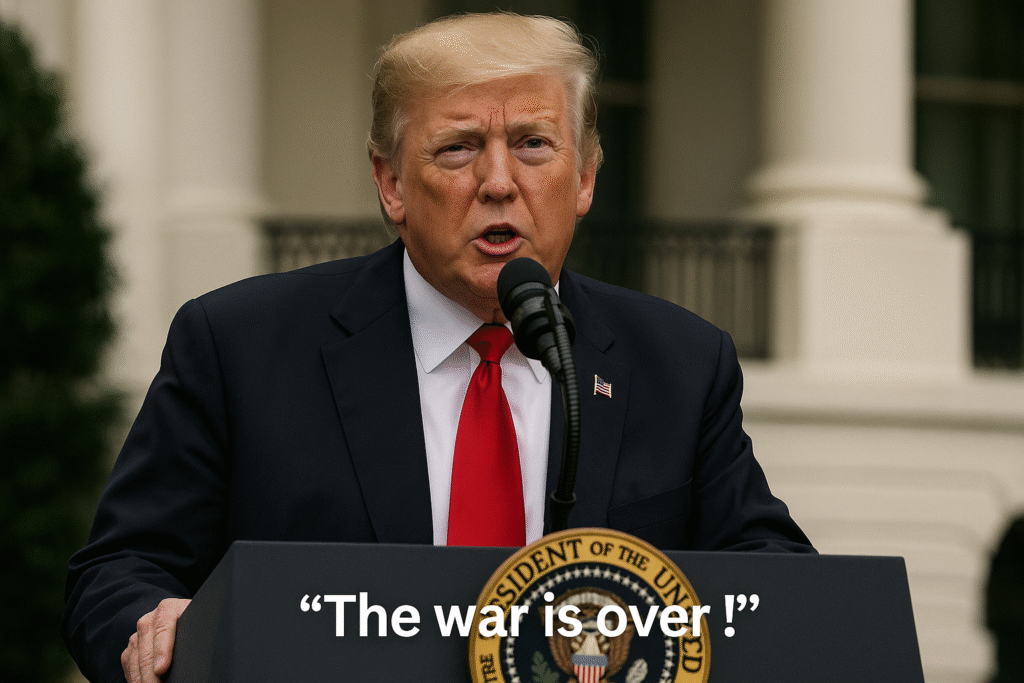By Harshit | October 13, 2025 | Tel Aviv, Israel | 10:00 AM
Trump Arrives in Israel, Declares End to Gaza War
U.S. President Donald Trump declared “the war is over” on Monday as he traveled to Israel to oversee the release of hostages from Gaza under the newly agreed ceasefire deal between Israel and Hamas.
Speaking aboard Air Force One, Trump said the ceasefire would hold and announced that a “Board of Peace” would soon be established to oversee reconstruction efforts in Gaza, describing the region as a “demolition site.”
He praised Israeli Prime Minister Benjamin Netanyahu and Qatar, which helped mediate the deal, and emphasized that the agreement marked “the beginning of a new era of peace in the Middle East.”
“Everybody is happy, and I think it’s going to stay that way,” Trump said. “I’m good at solving wars. I’m good at making peace.”
Hostage Release Underway
According to the ceasefire terms, Hamas must release all remaining Israeli hostages by midday local time (10:00 BST). The group is believed to be holding 20 living hostages and the remains of up to 28 deceased captives.
In exchange, Israel will release around 250 Palestinian prisoners and approximately 1,700 detainees from Gaza. A government spokesperson confirmed that the Palestinian prisoners would be freed once the Israeli hostages safely reach Israeli territory.
The exchange marks the first phase of a 20-point peace plan brokered by Trump, with subsequent phases still under negotiation. The ceasefire officially took effect on Friday morning, ending two years of relentless warfare.
War Casualties and Human Toll
The war was triggered by the Hamas-led attacks on southern Israel on October 7, 2023, which killed around 1,200 people and resulted in 251 hostages being taken.
Israel’s military response over the following two years devastated Gaza. According to the Hamas-run health ministry, more than 67,000 Palestinians have been killed, including over 18,000 children. Much of Gaza City now lies in ruins, with the UN estimating that three-quarters of its buildings have been damaged or destroyed.
“Gaza looks like a demolition site,” Trump remarked. “But over the next decades, I think it’s going to be a miracle.”
Trump’s Regional Tour and Peace Push
After his visit to Israel, Trump will travel to Egypt to participate in a summit at Sharm El-Sheikh, where more than 20 world leaders are expected to attend discussions on formalizing a permanent peace agreement.
Among the attendees will be UK Prime Minister Sir Keir Starmer, Palestinian President Mahmoud Abbas, French President Emmanuel Macron, and Egyptian President Abdel Fattah al-Sisi.
Egypt’s foreign ministry said a “document ending the war in the Gaza Strip” was expected to be signed during the summit. Trump is also scheduled to address the Israeli parliament, the Knesset, on Monday before departing for Egypt.
Iran and Other Regional Reactions
Iran confirmed it was invited to the Egypt summit but declined to participate. Foreign Minister Abbas Araghchi posted on X that while Iran welcomed any initiative to end “Israel’s genocide in Gaza,” it could not engage with nations that “continue to threaten and sanction us.”
“Iran welcomes any initiative that ends Israel’s genocide in Gaza and ensures the expulsion of occupation forces,” Araghchi wrote.
The Qatari and Turkish governments also expressed cautious optimism, calling the ceasefire a “fragile but essential first step toward regional stability.”
Challenges Ahead for Peace Implementation
While the ceasefire marks a major diplomatic breakthrough, the future governance of Gaza remains unresolved. Key issues include Israeli troop withdrawal, Hamas disarmament, and the establishment of a post-war administrative structure.
Trump said a “Board of Peace” would be created “very quickly” to oversee Gaza’s reconstruction and ensure international coordination. The body would reportedly include representatives from the United States, Egypt, Qatar, and Israel, though no formal announcement has yet been made.
Israel’s Defense Minister Israel Katz stated that once the hostages are released, the military would “complete the destruction of remaining Hamas tunnels” to ensure long-term security.
Humanitarian Aid and Famine Concerns
Aid trucks began entering Gaza on Sunday, with hundreds more queuing at the Egyptian border. UNICEF’s James Elder told the BBC that dozens of trucks had entered the Strip, but far more were needed.
The United Nations estimates that at least 600 trucks per day are required to meet Gaza’s humanitarian needs. In August, the Integrated Food Security Phase Classification (IPC) declared parts of Gaza in famine, including Gaza City.
Israel disputes the report, saying it is based on “Hamas propaganda” and claiming that it has made “extensive humanitarian efforts” through its military aid body, COGAT.

